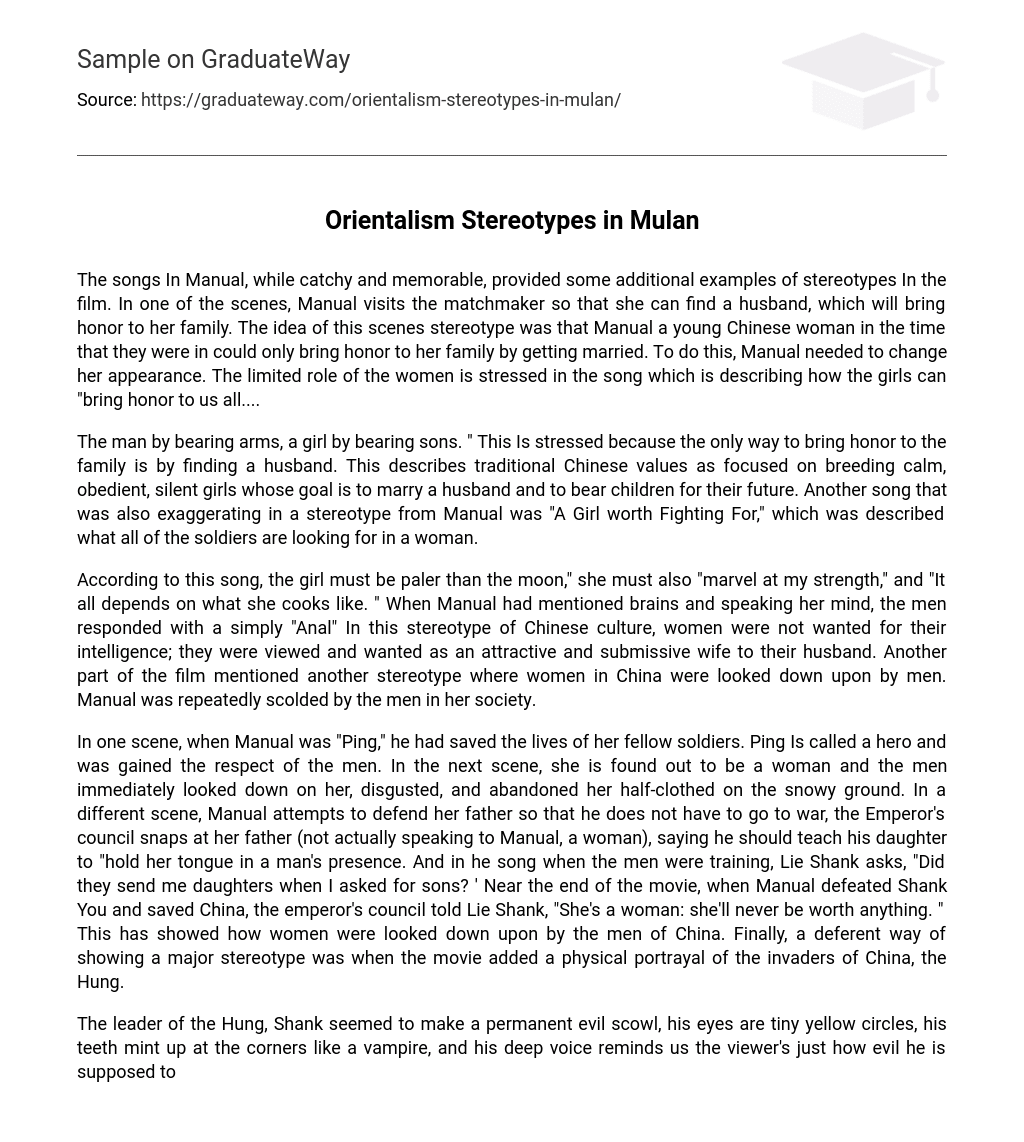The songs In Manual, while catchy and memorable, provided some additional examples of stereotypes In the film. In one of the scenes, Manual visits the matchmaker so that she can find a husband, which will bring honor to her family. The idea of this scenes stereotype was that Manual a young Chinese woman in the time that they were in could only bring honor to her family by getting married. To do this, Manual needed to change her appearance. The limited role of the women is stressed in the song which is describing how the girls can “bring honor to us all….
The man by bearing arms, a girl by bearing sons. ” This Is stressed because the only way to bring honor to the family is by finding a husband. This describes traditional Chinese values as focused on breeding calm, obedient, silent girls whose goal is to marry a husband and to bear children for their future. Another song that was also exaggerating in a stereotype from Manual was “A Girl worth Fighting For,” which was described what all of the soldiers are looking for in a woman.
According to this song, the girl must be paler than the moon,” she must also “marvel at my strength,” and “It all depends on what she cooks like. ” When Manual had mentioned brains and speaking her mind, the men responded with a simply “Anal” In this stereotype of Chinese culture, women were not wanted for their intelligence; they were viewed and wanted as an attractive and submissive wife to their husband. Another part of the film mentioned another stereotype where women in China were looked down upon by men. Manual was repeatedly scolded by the men in her society.
In one scene, when Manual was “Ping,” he had saved the lives of her fellow soldiers. Ping Is called a hero and was gained the respect of the men. In the next scene, she is found out to be a woman and the men immediately looked down on her, disgusted, and abandoned her half-clothed on the snowy ground. In a different scene, Manual attempts to defend her father so that he does not have to go to war, the Emperor’s council snaps at her father (not actually speaking to Manual, a woman), saying he should teach his daughter to “hold her tongue in a man’s presence. And in he song when the men were training, Lie Shank asks, “Did they send me daughters when I asked for sons? ‘ Near the end of the movie, when Manual defeated Shank You and saved China, the emperor’s council told Lie Shank, “She’s a woman: she’ll never be worth anything. ” This has showed how women were looked down upon by the men of China. Finally, a deferent way of showing a major stereotype was when the movie added a physical portrayal of the invaders of China, the Hung.
The leader of the Hung, Shank seemed to make a permanent evil scowl, his eyes are tiny yellow circles, his teeth mint up at the corners like a vampire, and his deep voice reminds us the viewer’s just how evil he is supposed to be. The Hung contrast the Chinese army strongly; while the Chinese have healthy-looking skin, the Hung are in a gray color, making them look dead. The Chinese characters throughout the movie usually tie their hair up neatly, but the Hung leave their hair untidy and down, showing their barbaric nature even further. Also, the atmosphere of the scene changes when the Hung are shown.
The sky gets darker when the Hung appear and in some scenes the sky is actually red when the Hung are shown and switch back to a blue clear sky when showing the Chinese camps and lands. The music also changes from a cheerful music background to an ominous tune when the Hung arrive. In conclusion, orientation stereotypes have influenced us in believing that it is true. The aim of the movie should not be to rise against every member of Chinese society in rebelliousness of customs and traditions, but to prove that one can keep their wishes and independence while keeping their own culture and identity.





